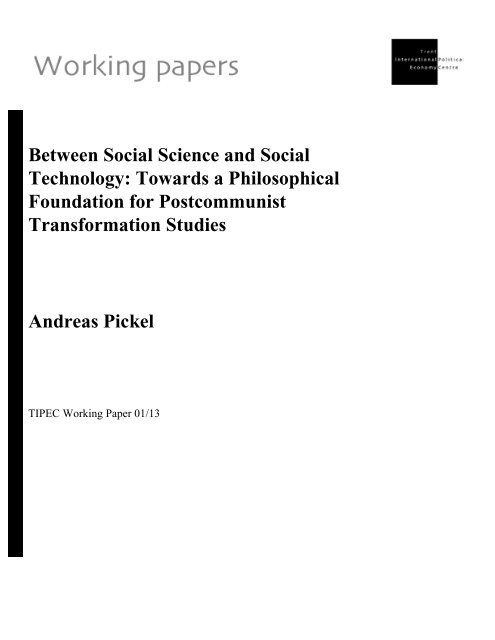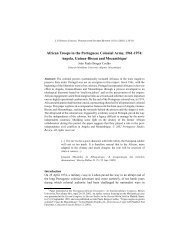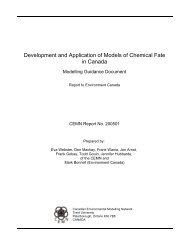Andreas Pickel, Between Social Science and ... - Trent University
Andreas Pickel, Between Social Science and ... - Trent University
Andreas Pickel, Between Social Science and ... - Trent University
Create successful ePaper yourself
Turn your PDF publications into a flip-book with our unique Google optimized e-Paper software.
<strong>Between</strong> <strong>Social</strong> <strong>Science</strong> <strong>and</strong> <strong>Social</strong><br />
Technology: Towards a Philosophical<br />
Foundation for Postcommunist<br />
Transformation Studies<br />
<strong>Andreas</strong> <strong>Pickel</strong><br />
TIPEC Working Paper 01/13
<strong>Andreas</strong> <strong>Pickel</strong>, <strong>Between</strong> <strong>Social</strong> <strong>Science</strong> <strong>and</strong> <strong>Social</strong> Technology<br />
Abstract<br />
This analysis examines fundamental questions at the intersection of social science<br />
<strong>and</strong> social technology, as well as problems of disciplinary divisions <strong>and</strong> the<br />
challenge of cross-disciplinary cooperation. Its theoretical-empirical context is<br />
provided by post-communist transformations, a set of profound societal changes<br />
in which institutional design plays a central role. The article critically reappraises<br />
the contribution of Karl Popper’s philosophy to this problem context; examines<br />
neoliberalism as social science <strong>and</strong> social technology, as well as the role of<br />
experts <strong>and</strong> disciplinary divisions in the reform process. Building on Mario<br />
Bunge’s social philosophy, it sketches basic elements of a cross-disciplinary<br />
approach to “social change by design.”
<strong>Andreas</strong> <strong>Pickel</strong>, <strong>Between</strong> <strong>Social</strong> <strong>Science</strong> <strong>and</strong> <strong>Social</strong> Technology 1<br />
Today it has become fashionable in the sciences to appeal to the specialized knowledge <strong>and</strong><br />
authority of experts, <strong>and</strong> fashionable in philosophy to denigrate science <strong>and</strong> rationality.<br />
Oftentimes, this denigration of science <strong>and</strong> rationality is due to a mistaken theory of science <strong>and</strong><br />
rationality – a theory which speaks of science <strong>and</strong> rationality in terms of specializations, experts,<br />
<strong>and</strong> authority. But science <strong>and</strong> rationality have really very little to do with specialization <strong>and</strong> the<br />
appeal to expert authority. On the contrary, these intellectual fashions are actually an obstacle to<br />
both. For just as the fashionable thinker is a prisoner of his fashion, the expert is a prisoner of his<br />
specialization. And it is the freedom from intellectual fashions <strong>and</strong> specializations that makes<br />
science <strong>and</strong> rationality possible (Popper 1994, ix).<br />
Context<br />
The present analysis examines fundamental questions at the intersection of social science <strong>and</strong><br />
social technology, as well as problems of disciplinary divisions <strong>and</strong> the challenge of crossdisciplinary<br />
cooperation. What follows is primarily a philosophical analysis that has as its<br />
substantive theoretical <strong>and</strong> empirical focus the general field of post-communist transformation<br />
studies. Emerging in the aftermath of the communist regime collapse in Eastern Europe <strong>and</strong> the<br />
Soviet Union, this is a relatively young field that has attracted scholars from a wide range of<br />
disciplines – economics, political science, sociology, geography, demography, psychology, as<br />
well as history, cultural studies, <strong>and</strong> philosophy. The field was quickly acknowledged as one of<br />
the best “social science laboratories” (Offe 1991) for disciplines that rarely have the opportunity<br />
to undertake their empirical studies under “laboratory” conditions. However, it is not just the<br />
great speed, the profound <strong>and</strong> comprehensive character, <strong>and</strong> the contemporaneity of social<br />
changes in the post-communist regions that qualify them as quasi-laboratories. In the age of<br />
globalization few places are spared the powerful effects of accelerated social change. Yet<br />
nowhere have we witnessed such conscious <strong>and</strong> concerted attempts to steer <strong>and</strong> control these<br />
macro processes of social change towards a well-defined set of systemic goals – attempts usually<br />
referred to as “making the transition to the market <strong>and</strong> democracy.” 1 The transition doctrines,<br />
plans, <strong>and</strong> policies that have been produced, reached dominance <strong>and</strong> have been implemented to<br />
varying degrees constitute what at any rate could be considered the most advanced forms of largescale<br />
social technology at the end of the twentieth century, as I will further explain below. As<br />
such, it is the design element of these change processes that makes them particularly relevant for<br />
social studies in general. In other words, what enhances the quasi-laboratory conditions of the<br />
post-communist regions is the fact that experiments in social engineering (to use Popper’s<br />
phrase) 2 are in fact being carried out, if not under the direct guidance of scientists themselves,<br />
then by politicians with the help of experts who presumably draw on scientific knowledge. Postcommunist<br />
studies thus is an excellent field for studying the relationship between social science<br />
<strong>and</strong> social technology <strong>and</strong> the challenge of cross-disciplinary cooperation. In the spirit of critical
<strong>Andreas</strong> <strong>Pickel</strong>, <strong>Between</strong> <strong>Social</strong> <strong>Science</strong> <strong>and</strong> <strong>Social</strong> Technology 2<br />
rationalism, this paper will revisit some of Karl Popper’s ideas of relevance in this context <strong>and</strong> try<br />
to improve upon them.<br />
Popper <strong>and</strong> Transformation Studies<br />
[M]y social theory (which favours gradual <strong>and</strong> piecemeal reform, reform controlled by a critical<br />
comparison between expected <strong>and</strong> achieved results) contrasts with my theory of method, which<br />
happens to be a theory of scientific <strong>and</strong> intellectual revolution (Popper 1994, 68).<br />
The most relevant contributions of Popper’s philosophy to the field of transformation studies I<br />
take to be: (1) the problem-oriented approach <strong>and</strong> (2) the critique of utopian social engineering.<br />
The first is particularly significant for questions of disciplinary division <strong>and</strong> cooperation. The<br />
second relates to the role of social science <strong>and</strong> social technology in social change. I will briefly<br />
introduce my own adaptation of the problem-oriented approach to transformation studies in the<br />
following section. Suffice it to say at this point that Popper’s insistence on the primacy of<br />
problems, both theoretical <strong>and</strong> practical, in advancing scientific knowledge relegates disciplinary<br />
boundaries <strong>and</strong> frameworks to the status of administrative divisions – whose intrinsic theoretical<br />
merit, if any, is more than offset by their tendency to stifle scientific inquiry (see, e.g. Popper<br />
1994, 1970).<br />
Popper’s critique of utopian social engineering (Popper 1966, 1972), developed in the<br />
context of the communist experiment of revolutionary social change by design, as well as his<br />
endorsement of “piecemeal social engineering,” have remained highly relevant for the postcommunist<br />
experiments (Dahrendorf 1990, Isaac 1996, Kabele <strong>and</strong> Radzai 1993, Murrell 1995,<br />
Murrell 1992, Soros 1998, Sullivan 1994). Ralf Dahrendorf, for example, in his Reflections on<br />
the Revolution in Europe (first published in 1990), explicitly refers to Popper’s conception of<br />
utopian vs piecemeal social engineering as he reflects on the tasks facing reformers in Eastern<br />
Europe immediately after the collapse of communism. Dahrendorf himself does not believe that<br />
Popper’s conception is helpful for the problem at h<strong>and</strong>. “Even apart from the unfortunate<br />
connotations of social engineering, ‘piecemeal’ is not quite enough when one is faced with a<br />
constitutional challenge” (Dahrendorf 1990, 161). In a decade of work in the field of postcommunist<br />
studies, I have gradually come to the conclusion that Dahrendorf is right: Popper’s<br />
conception is ultimately inadequate <strong>and</strong> even misleading, as I will try to show below. However,<br />
this is not to say that it does not contain valuable <strong>and</strong> highly relevant insights for some<br />
fundamental problems of social science <strong>and</strong> social technology. My own sense in 1989/90, while<br />
just completing a dissertation that used some of Popper’s arguments <strong>and</strong> insights to account for<br />
the peculiar <strong>and</strong> unintended consequences of East German private sector social engineering under
<strong>Andreas</strong> <strong>Pickel</strong>, <strong>Between</strong> <strong>Social</strong> <strong>Science</strong> <strong>and</strong> <strong>Social</strong> Technology 3<br />
communist rule (<strong>Pickel</strong> 1992a), was that the radical blueprints for the rapid transition to<br />
capitalism known as economic shock therapy could fruitfully be approached as contemporary<br />
instances of utopian social engineering. The proponents of radical, comprehensive reform<br />
doctrines as well as many other participants <strong>and</strong> observers of the events, by contrast, assumed that<br />
whereas the goal of socialism had been utopian, establishing a liberal market order supposedly<br />
was not. As a result, unlike his conception of the open society, Popper’s critique of utopian social<br />
engineering was not really considered applicable to post-communist Eastern Europe. Proponents<br />
of radical reforms feared primarily the political <strong>and</strong> bureaucratic opposition of anti-reformist<br />
interests rather than other, deeper obstacles in the way of reaching the non-utopian goal of the<br />
market. But it was precisely some of those deeper obstacles that Popper had in mind when he<br />
rejected “wholesale social engineering” as utopian. True, the context for his original critique was<br />
the Marxist-Leninist project of social transformation. But the force of his argument was directed<br />
against a specific, holistic approach to social reform, not simply against this or that set of utopian<br />
goals. Thus his critique applies equally to the neoliberal project of radical marketization. In<br />
Popper’s words: “Holistic or Utopian social engineering, as opposed to piecemeal social<br />
engineering . . . aims at remodeling the ‘whole of society’ in accordance with a definite plan or<br />
blueprint.”<br />
The piecemeal engineer knows, like Socrates, how little he knows. He knows that we can learn<br />
only from our mistakes. Accordingly, he will make his way, step by step, carefully comparing the<br />
results expected with the results achieved, <strong>and</strong> always on the look-out for the unavoidable<br />
unwanted consequences of any reform; <strong>and</strong> he will avoid undertaking reforms of a complexity <strong>and</strong><br />
scope which make it impossible for him to disentangle causes <strong>and</strong> effects, <strong>and</strong> to know what he is<br />
really doing (Popper 1976, 67).<br />
Popper’s epistemological argument seems to condemn any comprehensive <strong>and</strong> fundamental<br />
social reform project, including post-communist marketization <strong>and</strong> democratization, as utopian,<br />
for the systemic changes are necessarily of a complexity <strong>and</strong> scope that transcend the careful,<br />
step-by-step method he favors. However, the crux of his argument against the holistic approach<br />
is the claim that such wholesale changes turn out to be impossible to accomplish in practice.<br />
“The greater the holistic changes attempted, the greater are their unintended <strong>and</strong> largely<br />
unexpected repercussions, forcing upon the holistic engineer the expedient of piecemeal<br />
improvization.”<br />
[I]t continually leads the Utopian engineer to do things which he did not intend to do; that is to<br />
say, it leads to the notorious phenomenon of unplanned planning. Thus the difference between<br />
Utopian <strong>and</strong> piecemeal social engineering turns out, in practice, to be a difference not so much in<br />
scale <strong>and</strong> scope as in caution <strong>and</strong> preparedness for unavoidable surprises. One could also say that,<br />
in practice, the two methods differ in other ways than in scale <strong>and</strong> scope – in opposition to what<br />
we are led to expect if we compare the two doctrines concerning the proper methods of rational<br />
social reform (Popper 1976, 68-69).
<strong>Andreas</strong> <strong>Pickel</strong>, <strong>Between</strong> <strong>Social</strong> <strong>Science</strong> <strong>and</strong> <strong>Social</strong> Technology 4<br />
This fundamental insight, derived from Popper’s fallibilist epistemology, contributes significantly<br />
to our underst<strong>and</strong>ing of why radical liberalization programs in so many former communist<br />
countries were never fully implemented (<strong>Pickel</strong> <strong>and</strong> Wiesenthal 1997). They were conceived as a<br />
revolutionary process of “planned unplanning” <strong>and</strong> have ended up, precisely as Popper predicts,<br />
as processes of “unplanned planning.” Yet this central insight alone does not help us to explain<br />
the very significant differences in levels of success <strong>and</strong> failure attained by different reform<br />
countries in their clearly “holistic” – that is, comprehensive <strong>and</strong> large-scale, systemic – reform<br />
projects. The reason is that Popper’s epistemological insight is only one, albeit important, part of<br />
the story. It concerns directly only the limitations of our social scientific knowledge. That<br />
epistemological fallibilism has implications for social technology should be evident. However,<br />
what these implications are, <strong>and</strong> more specifically, what the relationship between social science<br />
<strong>and</strong> social technology is, could be, <strong>and</strong> should be, is barely examined in Popper’s work (see,<br />
however, Agassi 1985, Albert 1976, Bunge 1998, Dryzek 1990, Fischer 1993). Radical reformist<br />
doctrines of comprehensive liberalization (“planned unplanning”) were not primarily scientific<br />
claims (though all too often they were claimed to have scientific status). Rather, they were above<br />
all action plans for key reform policies <strong>and</strong> political platforms in the struggle for political power<br />
<strong>and</strong> ideological hegemony. As such, should they really be subject to the same criticisms as<br />
scientific theories?<br />
The Fundamental Problems of Post-Communist Transformation<br />
The work of the scientist does not start with the collection of data, but with the sensitive selection<br />
of a promising problem – a problem that is significant within the current problem situation, which<br />
in its turn is entirely dominated by our theories. [. . .] Scientific problems are preceded, of course,<br />
by pre-scientific problems, <strong>and</strong> especially by practical problems (Popper 1994, 155-156).<br />
In my own work on post-communist transformations, I have tried to explore the relationship<br />
between science, policy, <strong>and</strong> politics in somewhat greater depth. In this I was inspired by<br />
Popper’s problem-oriented approach, his second major contribution of relevance to<br />
transformation studies. While Popper has nowhere systematically developed such a problemoriented<br />
approach, it seems nevertheless fundamental to his fallibilist philosophy. In short,<br />
knowledge without absolute foundations that nonetheless is claimed to advance through trial <strong>and</strong><br />
error requires non-foundational criteria for identifying <strong>and</strong> criticizing our mistakes. Popper’s<br />
disciple W.W. Bartley has proposed four methods of criticism that can be applied to empirical<br />
theories, metaphysical assumptions, or political norms without themselves being based on any<br />
epistemological authority.
<strong>Andreas</strong> <strong>Pickel</strong>, <strong>Between</strong> <strong>Social</strong> <strong>Science</strong> <strong>and</strong> <strong>Social</strong> Technology 5<br />
We have at least four means of eliminating error by criticizing conjectures or speculations. These<br />
checks are listed in descending order according to their importance <strong>and</strong> the rigor with which they<br />
can be applied. (1) The check of logic: Is the theory in question consistent? (2) The check of sense<br />
observation: Is the theory empirically refutable by some sense observation? And if it is, do we<br />
know of any refutations of it? (3) The check of scientific theory: Is the theory, whether or not it is<br />
in conflict with sense observation, in conflict with any scientific hypotheses? (4) The check of the<br />
problem: What problem is the theory intended to solve? Does it do so successfully?” (Bartley<br />
1984, 127)<br />
In the following quotation, Popper himself elucidates what is implied by the check of the<br />
problem.<br />
[E]very rational theory, no matter whether scientific or philosophical, is rational in so far as it tries<br />
to solve certain problems. A theory is comprehensible <strong>and</strong> reasonable only in its relation to a<br />
given problem-situation, <strong>and</strong> it can be rationally discussed only by discussing this relation. Now<br />
if we look upon a theory as a proposed solution to a set of problems, then the theory immediately<br />
lends itself to critical discussion – even if it is non-empirical <strong>and</strong> irrefutable. For we can now ask<br />
questions such as, Does it solve the problem? Does it solve it better than other theories? Has is<br />
perhaps merely shifted the problem? Is the solution simple? Is it fruitful? Does it perhaps<br />
contradict other philosophical theories needed for solving other problems? (Popper 1965, 199)<br />
In my attempt to come to grips with the status <strong>and</strong> function of reformist doctrines in the postcommunist<br />
context, it became increasingly clear to me that their significance <strong>and</strong> power in the<br />
debate had little to do with their scientific credentials. Indeed, radical reform advocates have<br />
typically combined mainstream neoclassical economics, historicism, <strong>and</strong> market essentialism into<br />
an impressive looking “scientific” foundation for systemic transformation that serious social<br />
scientists could not possibly accept as such (<strong>Pickel</strong> 1995, 1997). Yet, radical market reformism<br />
has remained politically dominant, <strong>and</strong> it has arguably produced both transformation successes<br />
<strong>and</strong> failures. How could a scientifically weak doctrine remain so strong politically <strong>and</strong> even be<br />
implicated in some policy successes? In order to answer this somewhat puzzling question, let us<br />
begin by broadening Popper’s problem-oriented approach.<br />
Post-communist transformation processes relate to a host of fundamental theoretical<br />
problems in the social sciences – probably the main reason why it has become such an attractive<br />
field of study for scholars in these disciplines. Reform doctrines can be examined in terms of<br />
their theoretical content: any contemporary social reform doctrine that is internally inconsistent,<br />
empirically untenable, or seriously at odds with current social science knowledge is unlikely to be<br />
translated into rational, science-based reform policy (i.e. social technology). Neoliberalism, as<br />
we will see in a moment, is an instance of such a pseudo-scientific, or at best proto-scientific,<br />
reform doctrine. Problems of post-communist transformation at the theoretical level are<br />
problems of conceptualizing <strong>and</strong> explaining the changes under way in formerly or still communist<br />
countries in the context of a larger body of knowledge concerning processes of fundamental<br />
social change. Of particular importance at this level is the problem of fundamental reform, that
<strong>Andreas</strong> <strong>Pickel</strong>, <strong>Between</strong> <strong>Social</strong> <strong>Science</strong> <strong>and</strong> <strong>Social</strong> Technology 6<br />
is, the conditions for the possibility of controlled social change. The scientific evidence<br />
concerning the possibility of controlled holistic reform programs has in fact led most theorists,<br />
quite in line with Popper, to conclude that in modern complex societies such projects of planned<br />
systemic change are practically impossible (Wiesenthal 1997). However, while reform doctrines<br />
can <strong>and</strong> should be assessed by such scientific st<strong>and</strong>ards, this alone would give us only a very<br />
partial view of their overall strength. The reason is that reform doctrines are designed as well, or<br />
perhaps above all, to solve different types of problems.<br />
With the sudden <strong>and</strong> unexpected collapse of Communist regimes in 1989, there was an<br />
immediate practical, i.e. strategic <strong>and</strong> policy need for suitable reform doctrines. At the time, a<br />
political consensus quickly emerged that a controlled systemic transition from a centrally planned<br />
economy to a capitalist market economy was possible (Berend 1999, Szacki 1996), so the debate<br />
shifted largely to questions of strategy <strong>and</strong> policy. The problem context from this strategic,<br />
policy point of view differs in fundamental respects from the social scientific problem context.<br />
The strategic debate largely ignored the social sciences’ “impossibility theorem” <strong>and</strong>, for its<br />
practical purposes, adopted the opposite working assumption: the systemic transition from<br />
communism to capitalism can be achieved through a radical institutional break with the past <strong>and</strong><br />
the rapid introduction of a “market infrastructure.” Like any social technology designed to effect<br />
change, post-communist reform doctrines identify a given state of affairs as unsatisfactory, spell<br />
out the alternative state of affairs or goal to be reached, <strong>and</strong> assign the appropriate means or<br />
policies. Unlike social science, social technology is based on political norms <strong>and</strong> moral st<strong>and</strong>ards<br />
that determine what constitutes an unsatisfactory state of affairs, a desirable goal, <strong>and</strong> acceptable<br />
means. The particular problem situation after the collapse of communism favored rather stark<br />
<strong>and</strong> simplistic answers to these basic questions: the communist system was bankrupt, capitalism<br />
<strong>and</strong> liberal democracy were desirable <strong>and</strong> indeed “natural” or at least “historically inevitable,”<br />
<strong>and</strong> systemic change required little more than the elimination of the old system plus a set of<br />
liberalization measures. This radical simplification of reality <strong>and</strong> drastic conceptual reduction of<br />
the problem to a few crucial variables responded powerfully to the fundamental problem of<br />
strategy <strong>and</strong> policy in 1989. Richer, more nuanced conceptions (cf. gradualism; Murrell 1992,<br />
Poznanski 1995) proved to be too complex <strong>and</strong> normatively too ambiguous to provide<br />
competitive answers to the question, what is to be done. Of course, a social technology should<br />
not be judged solely in terms of its prospects for being adopted. The most basic st<strong>and</strong>ard to apply<br />
to any social technology is, does it work? Yet a social technology that is never adopted by<br />
definition cannot pass the test. A social technology that works barely, or generates mixed
<strong>Andreas</strong> <strong>Pickel</strong>, <strong>Between</strong> <strong>Social</strong> <strong>Science</strong> <strong>and</strong> <strong>Social</strong> Technology 7<br />
success, on the other h<strong>and</strong>, can be defended by its proponents in a variety of ways (Aslund 1995).<br />
This takes us from the level of strategy to the level of ideology <strong>and</strong> politics.<br />
From the definition of the political agenda to the legitimation of the political order, there<br />
is a range of problems that any society has to cope with in order to create a minimum of social<br />
stability, internal peace <strong>and</strong> external security, <strong>and</strong> thus the preconditions for the possibility of<br />
achieving more ambitious societal goals, such as stable democracy, prosperity, <strong>and</strong> regional<br />
integration. Societies undergoing rapid <strong>and</strong> profound changes experience these problems much<br />
more acutely than stable societies where established institutional mechanisms <strong>and</strong> routines may<br />
be so successful that these fundamental problems seem non-existent. Ideologies provide<br />
responses to these fundamental problems <strong>and</strong> are crucial in developing <strong>and</strong> maintaining these<br />
more permanent institutional mechanisms <strong>and</strong> routines. In this sense, the economic<br />
transformation of a society is perhaps above all a political challenge. The challenge of economic<br />
reform poses a variety of specific ideological <strong>and</strong> political problems: forging a vision for the new<br />
order, mobilizing voters for the reform programme, reaching elite consensus on policies, defining<br />
<strong>and</strong> securing the country’s place in the larger world, providing legitimation of policy outcomes<br />
<strong>and</strong> the emerging new order, maintaining the credibility of <strong>and</strong> commitment to the reform project,<br />
<strong>and</strong> holding political opponents in check. Any social technology for fundamental change has to<br />
prove itself in such an ideological <strong>and</strong> political problem context. Its relative success in those<br />
respects will determine not only whether a reform doctrine will be adopted, but also whether it<br />
will have a social <strong>and</strong> political environment within which, once adopted, it can work.<br />
In sum, social technologies such as post-communist reform doctrines should be evaluated<br />
using a problem-oriented approach. However, it is crucial to take into account the diverse<br />
problems <strong>and</strong> problem contexts in which social technologies have to prove themselves. We have<br />
discussed three general sets of problems <strong>and</strong> contexts: scientific knowledge (“is the doctrine<br />
true?”), strategy <strong>and</strong> policy (“does it work?”) <strong>and</strong> ideology <strong>and</strong> politics (“does it sell <strong>and</strong> do its<br />
clients remain faithful?”). Let us now illustrate our problem-oriented method by looking more<br />
closely at the most successful post-communist reform doctrine – neoliberalism.<br />
Neoliberalism as social technology<br />
Neoliberalism is probably the most influential doctrine of social change in the late twentieth<br />
century. 3 In the light of our distinction between three fundamental types of transformation<br />
problems – theoretical, strategic, <strong>and</strong> political – let us now look more closely at neoliberalism.<br />
As with any theory, doctrine or ideology, attempts to capture its “essence” can always be<br />
criticized as inaccurate, misleading, or simply a convenient target constructed by the critic for
<strong>Andreas</strong> <strong>Pickel</strong>, <strong>Between</strong> <strong>Social</strong> <strong>Science</strong> <strong>and</strong> <strong>Social</strong> Technology 8<br />
subsequent demolition. Our purpose here is not simply to expose neoliberalism as ideology. To<br />
acknowledge the fact that it provides answers to fundamental political <strong>and</strong> ideological questions<br />
is therefore not a criticism as such. There are no non-ideological answers to these questions. 4<br />
From a scientific point of view, we would ask the theoretical <strong>and</strong> empirical question whether <strong>and</strong><br />
to what extent the ideology is politically successful in a given problem context. From a<br />
normative point of view, we would ask moral <strong>and</strong> political questions about the ideology’s<br />
defensibility (even if successful, it may be reprehensible; cf. St<strong>and</strong>ing 1998).<br />
The political success of neoliberalism as an ideology of post-communist change in<br />
Eastern Europe is largely due to its contextual fit, that is, to the way in which it was able to<br />
address the fundamental problems of order <strong>and</strong> legitimacy after the collapse of communism <strong>and</strong><br />
the specific ideological <strong>and</strong> political problems of systemic reform sketched out above. At the<br />
same time, it is important to note the limits of neoliberalism’s success as an ideology in Eastern<br />
Europe, especially for purposes of domestic agenda setting, mobilization, <strong>and</strong> legitimization.<br />
Anti-liberal, ethnic nationalism has been <strong>and</strong> continues to be a powerful force in the whole<br />
region. The further east <strong>and</strong> south we move, the less successful has been the ideological strength<br />
of neoliberalism in terms of its domestic political purchase. As the ideology <strong>and</strong> discourse of<br />
globalization <strong>and</strong> regional integration, its popularity <strong>and</strong> situational fit seem to reflect closely a<br />
particular country’s prospects <strong>and</strong> its population’s self-perceptions along these lines. 5<br />
But neoliberal reform doctrines have also been extremely influential as social<br />
technologies for economic reform. In fact, most proponents of neoliberalism would flatly deny<br />
my characterization of their reform doctrines as ideological, a charge they usually reserve for<br />
their opponents. Neoliberals routinely invoke neoclassical economics as the scientific basis of<br />
their social technologies of market transition. We will examine the quality <strong>and</strong> strength of this<br />
basis below. Let us first note, however, that social technologies cannot be directly derived from<br />
scientific knowledge because they are neither politically nor morally neutral. (Conversely,<br />
reform doctrines that derive mainly from ideological precepts with little or no basis in current<br />
scientific knowledge should not be considered social technologies but merely techniques).<br />
Neoliberals tend to downplay or ignore the unavoidable normative dimensions of reform<br />
technology. In fact, by playing on the scientific credentials of economics as a discipline,<br />
neoliberals have been successful in selling their doctrines as expert social technology <strong>and</strong><br />
progressive ideology to the powerful, <strong>and</strong> even the less powerful. 6 The considerable<br />
sophistication with which neoliberal transition policies have been sold to reformers <strong>and</strong> many of<br />
the to-be-reformed suggests that this dimension of promoting their doctrines might itself be
<strong>Andreas</strong> <strong>Pickel</strong>, <strong>Between</strong> <strong>Social</strong> <strong>Science</strong> <strong>and</strong> <strong>Social</strong> Technology 9<br />
considered a social technology – more specifically as the cultural <strong>and</strong> political technology of<br />
spreading economic ideas (on Keynesianism, see Hall 1989; on neoliberalism, see George 1999).<br />
There continues to be a heated debate on the relative success of neoliberal reforms in<br />
post-communist Eastern Europe. Admittedly, the apparent simplicity of the question whether<br />
neoliberal social technology works, can work, or has worked is deceiving. Even if we accept the<br />
simplifying assumption that neoliberal reform doctrines were more or less followed for at least<br />
some time in the entire region (Zecchini 1997), the picture remains sufficiently ambivalent to<br />
support various, mutually inconsistent interpretations. They range from the dogmatic<br />
technocratic view that reform failures simply mirror inadequate adoption <strong>and</strong> implementation of<br />
radical reforms, to more nuanced views that take into account different initial conditions<br />
(Balcerowicz 1995), historical legacies (Jowitt 1992), social networks (Grabher <strong>and</strong> Stark 1997)<br />
or international dynamics (Bönker 1994, Chilton 1995) in the reform process. To complicate<br />
matters further, neoliberal reforms qua social technology can only be adequately judged if both<br />
empirical-theoretical <strong>and</strong> normative-political st<strong>and</strong>ards are applied. The debate tends to be<br />
hopelessly confused on this distinction, presenting normative (often patently ideological)<br />
judgments as scientific assessments, or conversely rejecting empirical evidence or theoretical<br />
arguments as ideological. Taking reform doctrines such as neoliberalism seriously as social<br />
technology, as is proposed here, injects some analytical clarity into this debate. Such doctrines are<br />
not – <strong>and</strong> should therefore not be presented as – just science, as many proponents of reform plans<br />
tend to do. At the same time, they are not – or at least may not be – just ideology, as their critics<br />
tend to charge (Gowan 1995). A social technology needs both a sound scientific basis <strong>and</strong> a<br />
sound moral-political basis. The remainder of the paper will focus on the scientific basis of<br />
neoliberal social technology. This will give us an opportunity to attend more closely to questions<br />
of interdisciplinarity, our second major theme.<br />
Transformation Studies, Experts, <strong>and</strong> the Disciplinary Division of Labour<br />
A necessary condition for unified policy-making is a unified social science (Bunge 1998, 452).<br />
Since the beginning of the transformations in 1989, experts have played crucial roles in the<br />
fundamental restructuring of formerly Communist economies <strong>and</strong> states. From the first wave of<br />
economic experts counseling shock therapy to the current wave of specialists in European Union<br />
rules <strong>and</strong> regulations (Jacoby forthcoming), a host of social technologies, mostly of Western
<strong>Andreas</strong> <strong>Pickel</strong>, <strong>Between</strong> <strong>Social</strong> <strong>Science</strong> <strong>and</strong> <strong>Social</strong> Technology 10<br />
origin 7 , have been adopted <strong>and</strong> adapted in the reform process. They include macroeconomic<br />
policies such as stabilization <strong>and</strong> liberalization, institutional reforms such as privatization <strong>and</strong><br />
social sector restructuring, constitutional reforms of the state such as democratization <strong>and</strong><br />
regionalization, as well as the introduction of innumerable new rules <strong>and</strong> regulations designed to<br />
create the framework of a liberal market economy <strong>and</strong> polyarchy on the remains of the<br />
Communist system. There can be no doubt that the systemic switch from an old <strong>and</strong> exhausted<br />
model of industrialism <strong>and</strong> centralism to a new <strong>and</strong> dynamic informational economy <strong>and</strong><br />
pluralistic politics depends for its success to a large extent on the expert knowledge of many<br />
different specialists. Whether it is banking reform, pension reform, electoral law, corporate law<br />
or environmental regulation, only specialists are in a position to design the requisite social<br />
technologies to bring into being such political <strong>and</strong> economic institutions.<br />
Many of the experts, <strong>and</strong> even more of the expert knowledge, have been imported from<br />
the West. This should be no surprise, since the economic <strong>and</strong> political systems to be created are<br />
those of Western capitalism <strong>and</strong> liberal democracy. What was missing, <strong>and</strong> what the West could<br />
not supply, was expertise in guiding such large-scale, complex, <strong>and</strong> interrelated transformation<br />
processes. The available specialized knowledge was helpful to the extent that limited<br />
sociotechnical systems were to be implanted. It was unhelpful <strong>and</strong> often dangerous to the extent<br />
that such limited sociotechnical systems depended for their anticipated functioning on a variety of<br />
formal-legal, informal cultural, <strong>and</strong> other preconditions that were not in place <strong>and</strong> could not easily<br />
be transplanted from their original context. Many social technologies for reform were more or<br />
less arbitrary abstractions from specialized knowledge that was insufficiently aware of its own<br />
embeddedness in a particular economic, political <strong>and</strong> cultural system. Thus the utopian character<br />
of such reform policies was not due to excessive scope but rather to an excessively limited,<br />
sectoral conception of reality <strong>and</strong> a corresponding piecemeal approach to changing it that is<br />
insufficiently holistic in perspective. Traditional disciplinary divisions in the social sciences have<br />
played a major role in this. Mainstream neoclassical economics, the scientific basis for neoliberal<br />
social technology, is a case in point.<br />
Economists <strong>and</strong> economic experts as a group probably enjoy the greatest influence <strong>and</strong><br />
respect among social scientists in the West. Their authority is based in part on a carefully<br />
maintained image of neoclassical economics as a genuine science (as opposed to such allegedly<br />
pre-scientific disciplines as sociology <strong>and</strong> political science). Politicians <strong>and</strong> the public at large,<br />
however, are rarely interested in the scientific discoveries of mainstream economists. They are<br />
interested in advice <strong>and</strong> forecasts that address practical problems. However, as we have seen<br />
above, such policy advice is at best part science, <strong>and</strong> always part ideology. The public authority
<strong>Andreas</strong> <strong>Pickel</strong>, <strong>Between</strong> <strong>Social</strong> <strong>Science</strong> <strong>and</strong> <strong>Social</strong> Technology 11<br />
of mainstream economists is closely related to their collective ability to have consumers of their<br />
expertise associate their policy advice with science, objectivity, <strong>and</strong> rationality, whereas the<br />
policy advice of dissenters is portrayed as unscientific, partisan, <strong>and</strong> ideological. The same<br />
mechanism, enhanced by the initial attractiveness of all things Western <strong>and</strong> the helping h<strong>and</strong> of<br />
Western financial institutions <strong>and</strong> political elites, has been transplanted to Eastern Europe <strong>and</strong><br />
placed economic experts in the role of “wholesale social engineers.”<br />
As a scientific basis for social technologies of post-communist transformation, however,<br />
neoclassical economics has surprisingly little to contribute. First, while the transition from a<br />
comm<strong>and</strong> economy to a liberal market economy obviously poses a range of economic problems,<br />
it also, <strong>and</strong> simultaneously, poses a range of institutional, political, <strong>and</strong> cultural problems.<br />
Mainstream economists usually do not claim specialized knowledge in the latter types of<br />
problems. In fact, their own claim to scientific status depends on a high degree of theoretical<br />
formalization that rests on a narrow <strong>and</strong> sectoral conception of the economy. (In addition, it is<br />
also based on highly problematic assumptions about human behaviour <strong>and</strong> society; Bunge 1998,<br />
Ch. 3). While the relevance of this knowledge for explaining economic phenomena even in<br />
established market systems is disputed, it is ruefully inadequate as a basis for systemic change by<br />
design. Neoclassical economics has no theory of society, but only an idealized <strong>and</strong> empirically<br />
<strong>and</strong> theoretically precarious model of a market economy. It therefore has no theory of social<br />
change, but only a set of implicit normative implications according to which ceteris paribus the<br />
closer the economic system is to the stylized market economy, the more efficient the outcomes. It<br />
has a highly problematic basis for drawing explicit normative or policy conclusions in welfare<br />
economics, but this is a pseudo-scientific attempt to avoid addressing normative <strong>and</strong> political<br />
questions explicitly (Albert 1978, Ch. 5; Bunge 1998, Ch. 10; Myrdal 1954). As a result, policy<br />
advice presumably based on, or even “derived from,” neoclassical economics is in large measure<br />
ideological, while at the same time denying, or failing to make explicit, its normative<br />
assumptions. The central values embedded in neoliberal ideology, the most common ideology to<br />
accompany neoclassical theory, places the individual above society, endorses a vision of the<br />
individual as a homo oeconomicus, accepts <strong>and</strong> defends high degrees of social inequality, <strong>and</strong>,<br />
partly because it has so little sense <strong>and</strong> underst<strong>and</strong>ing of the social, opposes any form of<br />
collective political action, except when in defense of the market order.<br />
To be sure, the academic discipline of mainstream economics cannot be held primarily<br />
responsible for the consequences of any social technologies designed in its name, though barely<br />
on its basis. Mainstream economics as a science has, especially in its more recent move towards<br />
ever greater formalization <strong>and</strong> mathematization, not even shown particularly strong interest in so-
<strong>Andreas</strong> <strong>Pickel</strong>, <strong>Between</strong> <strong>Social</strong> <strong>Science</strong> <strong>and</strong> <strong>Social</strong> Technology 12<br />
called real-world problems. It is thus a great irony that post-communist economic<br />
transformations were so powerfully influenced by the advice of economic experts whose<br />
scientific knowledge had so little relevance for the sociotechnological problems of systemic<br />
change.<br />
Another branch of social science that sometimes claims to look at the big picture <strong>and</strong> has<br />
had some, albeit much less, influence on post-communist transformations, is political science.<br />
The intrusion of so-called “transitologists,” that is, specialists on democratization, into the field of<br />
post-communist transformation studies has sparked a lively debate on the role of generalizing vs<br />
contextually-limited approaches to studying democratization (Bunce 1995, Karl <strong>and</strong> Schmitter<br />
1995). Unlike their colleagues in the marketization branch of transformation studies,<br />
transitologists have played at best a modest role in advising reform governments on political<br />
reform. The equivalent of the economic shock therapists in the early stages of transformation<br />
were human rights lawyers, who in Popperian spirit advocated “negative constitutionalism – the<br />
notion that constitutions have a primarily negative purpose of preventing tyranny” (Holmes 1995;<br />
cf. also <strong>Pickel</strong> 1989). The narrowness of both politico-technological <strong>and</strong> economicotechnological<br />
approaches, however, cannot be blamed entirely on the social engineers who might<br />
have inadvertently or willfully ignored a vast body of social science knowledge, only waiting to<br />
be translated into post-communist reform plans. The problem was <strong>and</strong> is also one of divided,<br />
compartmentalized <strong>and</strong> often irrelevant social science knowledge. Most important, none of the<br />
social sciences was able to provide the kind of integrated, indeed holistic, approach <strong>and</strong><br />
overarching perspective that the practical problems of transformation required (Müller 1995; the<br />
only partial exception, neo-marxist approaches, were politically discredited). In the breach<br />
jumped self-appointed experts <strong>and</strong> ideologues whose reform prescriptions were based on political<br />
attractiveness, common sense, intuition, <strong>and</strong> abstractions of Western models. The result was<br />
piecemeal social engineering, albeit in a negative sense: large-scale reform policies were<br />
launched in some sectors of society, resulting in major unintended consequences in others,<br />
leading to “unplanned planning” <strong>and</strong> generating enormous social <strong>and</strong> economic costs.<br />
A <strong>Social</strong> Philosophy for a Unified <strong>Social</strong> <strong>Science</strong><br />
A well-rounded social philosophy must include a positive theory of society along with a positive<br />
moral philosophy--that is, one positing social goods, however debatable <strong>and</strong> changeable. Without<br />
such a global <strong>and</strong> positive social philosophy, no clear vision of an open society can emerge. And<br />
without such vision, people won't be mobilized to build the new society (Bunge 1996b, 552).<br />
Popper’s social philosophy contains many useful suggestions for the theory <strong>and</strong> practice of<br />
transformation. 8 In particular, his strong critique of utopian blueprints for reform has remained of
<strong>Andreas</strong> <strong>Pickel</strong>, <strong>Between</strong> <strong>Social</strong> <strong>Science</strong> <strong>and</strong> <strong>Social</strong> Technology 13<br />
some relevance here, as I have tried to show above. An even more important, methodological<br />
tool, in my view, is Popper’s problem-oriented approach, even if he did not sufficiently elaborate<br />
it for problems of social science theorizing, planning, <strong>and</strong> implementing social changes. In fact,<br />
as Mario Bunge reminds us:<br />
Although he favored planned social reform, Popper never put forth any constructive proposals for<br />
it. Moreover, he did not examine in detail any of the social technologies, such as normative<br />
macroeconomics, city planning, social medicine, the law, or management science, all of which<br />
raise interesting ontological <strong>and</strong> epistemological problems--such as, for instance, the question of<br />
the very nature of plans as different from theories. (Moreover, he was not entirely clear about the<br />
distinction between social science <strong>and</strong> social technology.) [. . .] By writing off all ideologies--<strong>and</strong><br />
moreover without analyzing in any detail the very concept of an ideology--Popper locked himself<br />
out of political science <strong>and</strong> political philosophy (Bunge 1996b, 542-543).<br />
The problem of controlling political rulers, perhaps the centrepiece of Popper’s social philosophy,<br />
identifies one, albeit not the only or even the central problem of politics. Two at least equally<br />
fundamental problems are the problem of political order <strong>and</strong> the problem of political legitimacy<br />
(<strong>Pickel</strong> 1989, Eidlin 1997). Moreover, post-communist transformation is not confined to changes<br />
in the political system. It includes simultaneous <strong>and</strong> interrelated changes in economic <strong>and</strong><br />
cultural systems, embedded in regional <strong>and</strong> global dynamics, that raise fundamental problems of<br />
their own. It is here that the limits of Popper’s social philosophy become particularly evident.<br />
Popper has had nothing original, let alone constructive, to say about any social order, actual or<br />
desirable, beyond that it should be nontyrannical <strong>and</strong> should involve the protection of the destitute.<br />
[ . . .] Popper's social philosophy lacks a theory about social order because he has neither a theory<br />
of society nor a positive moral philosophy. All Popper's social philosophy does is admonish us to<br />
replace the substantive traditional question "Who shall be the rulers?" with the procedural question<br />
"How can we tame them?" [. . .] In other words, Popper's conception <strong>and</strong> defense of liberty <strong>and</strong><br />
democracy is limited to law <strong>and</strong> politics, <strong>and</strong> even then only to their mechanics. It warns us against<br />
despotism but does not help us redesign society to remove the sources of tyranny. Hence Popper's<br />
praise of social engineering, though sincere, rings hollow: it enjoins us to plan without specifying<br />
any goals other than freedom. The result is a negative, spotty, superficial, formalist, <strong>and</strong> at places<br />
inconsistent social philosophy. It bears no comparison with the social philosophies of Khaldun,<br />
Machiavelli, Spinoza, Hobbes, Locke, Montesquieu, Rousseau, Mill, Marx, or even Paine,<br />
Kropotkin, or Laski. In my opinion it is also inferior to Popper's own contribution to the theory of<br />
knowledge, in particular his successful demolition of inductive logic <strong>and</strong> defense of<br />
epistemological realism (Bunge 1996b, 550-551).<br />
Even if Popper’s social philosophy is admittedly “thin,” in the sense that it has a narrow view of<br />
politics, little to say about economics <strong>and</strong> culture, <strong>and</strong> is unhelpful for the crucial distinction<br />
between problems of social science, social technology, <strong>and</strong> ideology, does it not provide at least<br />
an innovative methodological approach to social theorizing in the form of the “logic of the<br />
situation”? As a matter of historical record, the “logic of the situation” has not had any<br />
significant influence in the social sciences. Popper’s version of methodological individualism is<br />
at odds with the very popular <strong>and</strong> influential rational choice model (Agassi 1987). And it is
<strong>Andreas</strong> <strong>Pickel</strong>, <strong>Between</strong> <strong>Social</strong> <strong>Science</strong> <strong>and</strong> <strong>Social</strong> Technology 14<br />
obviously opposed to all approaches in the social sciences that espouse one or the other version of<br />
methodological holism. A recent symposium reexamining Popper’s model of situational analysis<br />
has yielded a mixed verdict on its usefulness <strong>and</strong> relevance (Philosophy of the <strong>Social</strong> <strong>Science</strong>s<br />
1998). Popper’s methodological individualism recapitulates an ontological individualism in the<br />
tradition of Mill, Weber, <strong>and</strong> neoclassical economics. This individualism – both ontological <strong>and</strong><br />
methodological – has significant merits as a critical response to holism or collectivism, but it<br />
reaffirms a questionable alternative. As Bunge points out, individualism commits us to the view<br />
that there are no social entities with supraindividual features. This is highly problematic for two<br />
reasons.<br />
One is that every human being is part of several social systems--such as families, business firms,<br />
schools, clubs, <strong>and</strong> informal social networks--so that his behavior is unintelligible without<br />
reference to them. Another reason is that every social system is characterized by emergent or<br />
systemic properties, such as social structure, viability, cohesion, history, progress, decline, <strong>and</strong><br />
wealth distribution. [. . .] Whoever denies the existence of social systems is bound to either<br />
smuggle them in or invent surrogates for them. Popper was no exception. Indeed, to explain<br />
individual actions, Popper invokes institutions <strong>and</strong> "situations" (or "states of affair") as other<br />
individualists invoke "contexts" <strong>and</strong> "circumstances. [. . .] The entire "logic of the situation"<br />
resorts then to supraindividual items . . . Popper's social ontology may therefore be characterized<br />
as individholistic rather than as consistently individualistic. (More on this hybrid in Bunge 1996a.)<br />
What alternative, substantive social philosophy is there for a critical rationalist working on<br />
problems of post-communist transformation – one that would be consistent with a problemoriented<br />
approach, would empower us to transgress disciplinary borders, <strong>and</strong> give us tools to deal<br />
with the relationship between social science <strong>and</strong> social technology?<br />
Towards a Cross-Disciplinary Approach to Post-Communist Transformation<br />
Constructive action, whether individual or social, calls for positive views <strong>and</strong> plans in addition to<br />
rational discussions of goals <strong>and</strong> means. In particular, the design, planning, <strong>and</strong> construction of a<br />
better social order requires more than a h<strong>and</strong>ful of danger signals to help avoid or fight tyranny: it<br />
also calls for a positive social philosophy including a clear vision of the open society--one capable<br />
of motivating <strong>and</strong> mobilizing people. (The warning "Here be dragons" may be helpful, but it does<br />
not point to the right way.) And such a philosophy had better form a system rather than an<br />
aggregate of disjoint views, for social issues--like any correct ideas about them--happen to come in<br />
bundles, not one at a time. One step at a time, yes; one thing at a time, no (Bunge 1996b, 553-<br />
554).<br />
Much of the transition literature follows conventional disciplinary lines of inquiry. This is as true<br />
for the economics literature as for the political science literature on post-communist<br />
transformation, the two fields that account for the bulk of scholarly production in the first decade<br />
of post-communist “transitology.” Much of this literature, even when it has not explicitly taken<br />
the form of policy advice, appears to be normatively <strong>and</strong> ideologically driven. Specifically,
<strong>Andreas</strong> <strong>Pickel</strong>, <strong>Between</strong> <strong>Social</strong> <strong>Science</strong> <strong>and</strong> <strong>Social</strong> Technology 15<br />
economists are working on the premise that the telos of transformation is the establishment of a<br />
Western-style market economy, while political scientists are studying the conditions for <strong>and</strong><br />
obstacles to democratization <strong>and</strong> democratic consolidation along Western lines. The problem is<br />
not the presence of normative <strong>and</strong> ideological assumptions as such, but rather the often implicit<br />
adoption of the view that the radical change processes occurring in post-communist <strong>and</strong> other<br />
reforming countries are best conceptualized as “catching-up modernization” (Habermas) <strong>and</strong><br />
Westernization. From this perspective, it appears reasonable to approach the study of<br />
transformation as a country’s successful or unsuccessful approximation of an – often idealized –<br />
Western economic, political, <strong>and</strong> cultural model, each dimension of which is best studied on its<br />
own by the competent social science discipline.<br />
Along with other critical voices in the debate (see, among others, Grabher <strong>and</strong> Stark<br />
1997, Greskovits 1998, Rona-Tas 1997), I contend that the Westernization or convergence thesis<br />
is not the most appropriate, <strong>and</strong> potentially a quite misleading, point of departure for the<br />
formulation of the fundamental problems of transformation. It uncritically accepts the premises<br />
<strong>and</strong> goals of a political project as basic assumptions for social science theorizing. I propose, by<br />
contrast, to conceptualize systemic changes “on their own terms” <strong>and</strong> in a more open <strong>and</strong> broader<br />
fashion. More concretely, we should remain sensitive to the different degrees to which the<br />
political project of Westernization is pursued by various actors <strong>and</strong> as such constitutes important<br />
causal factors that need to be closely examined. However, we need to be equally interested in<br />
investigating the actual dynamics of change in the transforming societies that cannot be captured<br />
by viewing phenomena of social change discretely as more or less successful instances of<br />
economic, or political, or cultural Westernization. In the remainder of the paper, I sketch out a<br />
social theoretical foundation for transformation studies that is consistent with a problem-oriented<br />
approach, helps us to transgress disciplinary boundaries, <strong>and</strong> gives us tools to deal with the<br />
relationship between social science <strong>and</strong> social technology. Most of its central ideas are drawn<br />
from the philosophy of Mario Bunge.<br />
Framework: Systemism<br />
Systemism is an alternative to both individualism <strong>and</strong> holism. It accounts for both individual<br />
agency <strong>and</strong> social structure. It postulates that everything is a system or a component of one. It<br />
models every system in terms of composition, environment, <strong>and</strong> structure. It breaks down society<br />
into four major subsystems – biological or kinship system, economic system, political system,<br />
<strong>and</strong> cultural system. It can be applied at sub-national, national, <strong>and</strong> transnational levels of<br />
analysis. Above the level of societies organized within nation-states, there are regional
<strong>Andreas</strong> <strong>Pickel</strong>, <strong>Between</strong> <strong>Social</strong> <strong>Science</strong> <strong>and</strong> <strong>Social</strong> Technology 16<br />
“supersocieties” (e.g. EU) as well as the world social system. It is important to note that, unlike<br />
Parsonian systems theory, systemism is not a theory but only a framework or approach, “just a<br />
skeleton to be fleshed out with specific hypotheses <strong>and</strong> data” (Bunge 1996a, 265; further on<br />
systemism, Bunge 1996a, Ch. 10; 1998, Ch. 6.3). As such, it is not “static” or blind to processes<br />
of conflict <strong>and</strong> change. “[A]doption of the systemic approach will avoid the pitfalls <strong>and</strong> tunnel<br />
vision which the narrow specialist invariably falls into, incapable as he is of taking into account<br />
any features that are not studied in his field. In other words, systemism favors interdisciplinarity<br />
<strong>and</strong> multidisciplinarity. By the same token, it helps to avoid the costly mistakes made by the<br />
specialist – scientist or technologist, policymaker or manager – who overlooks most of the<br />
features of the real system he studies, designs, or steers” (Bunge 1996a, 266).<br />
Key Theoretical Concept: Change Mechanisms<br />
Mechanismic explanation is not to be confused with mechanical explanations. “Whereas a few of<br />
the mechanisms studied by contemporary science <strong>and</strong> technology are mechanical, most are not.<br />
Indeed, there are mechanisms of many kinds: electromagnetic, nuclear, chemical, cellular,<br />
intercellular, ecological, economic, political, <strong>and</strong> so on. Any explanation involving reference to a<br />
mechanism may be said to be mechanismic” (Bunge 1997, 411). Mechanismic explanation<br />
differs from most st<strong>and</strong>ard modes of explanation employed in the social sciences: the<br />
neopositivists’ “covering law” model of scientific explanation, the interpretive approach of the<br />
hermeneutic or Verstehen school, as well as functional <strong>and</strong> teleological modes of explanation.<br />
Like any sweeping <strong>and</strong> profound social changes, post-communist transformations affect<br />
all areas of society. They are “likely to be biological, psychological, demographic, economic,<br />
political <strong>and</strong> cultural – either simultaneously or in succession. Hence, the mechanism of every<br />
major social change is likely to be a combination of mechanisms of various kinds coupled<br />
together” (Bunge 1997, 417). The systemic framework serves to get these different <strong>and</strong><br />
interrelated transformation processes into view. The mechanismic mode of explanation helps us<br />
to search out <strong>and</strong> reconstruct the major transformation processes. To be sure, we are not looking<br />
for anything like a universal “post-communist transformation mechanism.” On the contrary,<br />
“concrete, lawful, <strong>and</strong> scrutable mechanisms are specific, or, if preferred, substance dependent.<br />
Hence, there can be no universal explanations of the mechanismic kind. [ . . .] Different kinds of<br />
systems, with different mechanisms <strong>and</strong> under different forces, call for different explanations”<br />
(Bunge 1997, 439-440). “Although all mechanisms are specific (or substrate dependent), it is<br />
possible <strong>and</strong> desirable to group them into large classes on the strength of their similarities”<br />
(Bunge 1997, 450). Bunge offers the following definition of a social mechanism:
<strong>Andreas</strong> <strong>Pickel</strong>, <strong>Between</strong> <strong>Social</strong> <strong>Science</strong> <strong>and</strong> <strong>Social</strong> Technology 17<br />
We define a social mechanism as a mechanism in a social system. Since every mechanism is a<br />
process in some system, a social mechanism is a process involving at least two agents engaged in<br />
forming, maintaining, transforming, or dismantling a social system. There are many types of<br />
social system: think, for example, of childless couples <strong>and</strong> extended families, streetcorner gangs<br />
<strong>and</strong> informal social networks, schools <strong>and</strong> churches, factories <strong>and</strong> supermarkets, economies <strong>and</strong><br />
polities, <strong>and</strong> local governments <strong>and</strong> multinational blocs. Correspondingly, there is a large variety<br />
of social mechanisms (Bunge 1997, 447).<br />
The social mechanisms at the centre of post-communist transformation are the major<br />
change mechanisms in the transformation of individual countries. However, we also need to pay<br />
special attention to transnational (regional, global) <strong>and</strong> subnational systems. Thus, for example,<br />
the European Union as a transnational system in its interaction with transforming countries<br />
(national systems), or the Russian regions as subnational systems interacting with the centre, are<br />
likely to be important elements of major change mechanisms. The concept of change mechanism<br />
should not be confused with the concept of system. “Note that our definition presupposes a<br />
distinction between system <strong>and</strong> mechanism: the latter is a process in a system. This distinction is<br />
familiar in natural science, where one is not expected to mistake, say, the cardiovascular system<br />
for the circulation of the blood or the brain with mental processes. But it is unusual in social<br />
studies . . . “ (Bunge 1997, 447). “Mechanism is to system as motion is to body, combination (or<br />
dissociation) to chemical compound, <strong>and</strong> thinking to brain” (Bunge 1997, 449).<br />
One potential source of confusion is the fact that we are dealing with systemic change, so<br />
that the major social mechanisms in the transformation occur in systems that are themselves<br />
changing -- evolving, adapting, or collapsing. Describing fundamental systemic changes in terms<br />
of the rate of privatization or liberalization, for instance, is not the same as explanation in terms of<br />
major change mechanism. Rate or degree of privatization is an – often overrated <strong>and</strong><br />
misinterpreted – indicator of systemic change. By contrast, a major change mechanism involves<br />
the concrete system within which this process is taking place (i.e. its particular composition,<br />
structure, <strong>and</strong> environment), <strong>and</strong> the actual outcome (new, hybrid, or collapsed system).<br />
Thus, marketization refers to a set of major change mechanisms, market reforms are the<br />
designed elements in change mechanisms, <strong>and</strong> the economy is the system (more accurately: one<br />
of the systems) that is being changed <strong>and</strong> changing. In contrast to the voluntaristic <strong>and</strong><br />
individualistic assumptions that figure prominently in much of the neoliberal transformation<br />
literature, the approach presented here does not equate change mechanisms with reform policies.<br />
In contrast to the structuralist assumptions that are assigned dominance in much of the critical <strong>and</strong><br />
culturalist literature, this approach does not reduce change mechanisms to “deeper structural<br />
factors.” In the systemic view, “agency is both constrained <strong>and</strong> motivated by structure, <strong>and</strong> in<br />
turn the latter is maintained or altered by individual action. In other words, social mechanisms
<strong>Andreas</strong> <strong>Pickel</strong>, <strong>Between</strong> <strong>Social</strong> <strong>Science</strong> <strong>and</strong> <strong>Social</strong> Technology 18<br />
reside neither in persons nor in their environment – they are part of the processes that unfold in<br />
or among social systems” (Bunge 1997, 448; emphasis added). This conception of social<br />
mechanisms also has significant implications for the fundamental problem of the role of social<br />
technology in systemic change.<br />
<strong>Between</strong> <strong>Social</strong> <strong>Science</strong> <strong>and</strong> <strong>Social</strong> Technology: Catalytic designs<br />
In much of the neoliberal market transition literature, a central assumption is that “the new<br />
system” can in fact be designed, since the major mechanisms that maintain a market economy are<br />
presumably known, <strong>and</strong> so are the mechanisms (i.e. reforms policies) to put them in place. The<br />
two – maintenance <strong>and</strong> creation of a market economy – are of course not the same. There may be<br />
somewhat more knowledge about maintaining established <strong>and</strong> relatively successful market<br />
economies in the West than about creating them under a variety of conditions in the rest of the<br />
world. Yet skepticism is called for with respect to the claim that both types of major mechanisms<br />
are fully or even sufficiently known. There is the ideological claim that a market system<br />
spontaneously creates socially desirable outcomes. In other words, the social mechanisms that<br />
make this particular type of economic system successful are said to be spontaneous as opposed to<br />
controlled, economic rather than political, decentralized rather than centralized, as well as<br />
intrinsically just (Hayek 1989). This ideological claim, based on empirically untested or<br />
untenable assumptions, entails the dem<strong>and</strong> to design <strong>and</strong> establish an economic system in a<br />
controlled, political <strong>and</strong> centralized fashion that will henceforth maintain itself spontaneously,<br />
without the need for political intervention, <strong>and</strong> in a decentralized way. Describing these ideas in<br />
terms of social mechanisms brings out the paradoxical role that design plays in the neoliberal<br />
transition literature. Faith in the possibility of rationally designing <strong>and</strong> establishing a specific<br />
type of economic system, on the one h<strong>and</strong>, goes h<strong>and</strong> in h<strong>and</strong> with the deep conviction that once<br />
established, rational design should not be employed to alter the way the system works, on the<br />
other.<br />
I take my own position between the two poles of the neoliberal paradox. I am at the same<br />
time more <strong>and</strong> less sanguine about the role of design in economic <strong>and</strong> social life. There is both<br />
spontaneity <strong>and</strong> design in most processes of social change <strong>and</strong> continuity. “Whereas some social<br />
systems <strong>and</strong> their corresponding mechanisms emerge more or less spontaneously, others are<br />
designed” (Bunge 1997, 452). Where designs do play an important role, the particular way in<br />
which they contribute to social change may contain different mixes of intended, unintended, <strong>and</strong><br />
perverse effects (Hirschman 1992, Merton 1968, Ch. III). In order to advance our underst<strong>and</strong>ing<br />
of the actual role of design in post-communist transformation, I conceptualize designs as elements
<strong>Andreas</strong> <strong>Pickel</strong>, <strong>Between</strong> <strong>Social</strong> <strong>Science</strong> <strong>and</strong> <strong>Social</strong> Technology 19<br />
in larger change mechanisms. In order to underscore this broader conception of design, I speak of<br />
catalytic design. (Using the term “catalytic” in its broad sense of an agent that stimulates or<br />
precipitates a reaction, development, or change.)<br />
Catalytic design is not simply a policy blueprint or institutional template. It may contain<br />
that, but it is more (<strong>and</strong> that “more” is what determines how policy blueprints or institutional<br />
transfers work): it is the vision or ideological model; the shifts in political alliances – domestic<br />
<strong>and</strong> international -- it builds on or opens up; the potential for redefining state-society relations; the<br />
major ways in which society is <strong>and</strong> is not restructured in the process. It is also less, for even the<br />
attempt to faithfully implement a blueprint of a new order can never succeed fully (rational policy<br />
fallacy).<br />
The catalytic design is an emergent property. As far as catalytic designs for systemic<br />
change are concerned, the state (more precisely: various state actors <strong>and</strong> institutions) is its major<br />
– though clearly not exclusive nor necessarily decisive – agent. This is why we need to pay<br />
particular attention to the type <strong>and</strong> role of the state in its global context. For example, for the<br />
Central-Eastern European states, EU integration is the centrepiece of their respective catalytic<br />
designs for postcommunist political-economic transformation. If we look for a “rational design”<br />
at the core of systemic change, it encompasses the broader historical <strong>and</strong> systemic context plus<br />
reform policies <strong>and</strong> politics (really: the “rational design” is our model of what is going on, i.e. our<br />
rational reconstruction). In this sense we describe <strong>and</strong> explain the “catalytic design” (i.e. model<br />
of change) as an emergent property, though clearly not as much of an historical accident as the<br />
original emergence of market society, <strong>and</strong> with a greatly more prominent role for human<br />
designers <strong>and</strong> designs.<br />
Finally, I propose to look at the systemic context (domestic <strong>and</strong> international structures)<br />
plus the design (models, templates, <strong>and</strong> policies) very much as catalysts rather than as a fullfledged<br />
plan for systemic change. Catalysts in the sense that they provide only a set of conditions<br />
<strong>and</strong> forces within which processes of social <strong>and</strong> economic change occur ‘spontaneously’ (in the<br />
sense of unplanned, <strong>and</strong> to some extent unintended) – thus: catalytic design. Thus the same<br />
reform measure, change policy, institutional model or social technology may have different<br />
effects in different contexts (e.g. stabilization, privatization). Viewed in conventional terms of<br />
design, the policy is assumed to work unless there is something “wrong” in the political,<br />
economic, or cultural context in which it is “implemented.” From our alternative viewpoint, a<br />
rational design or set of reform policies should not be understood as a simple means to an end that<br />
works or doesn’t work. Rather, reform policies, like the general ideologies with which they are<br />
associated (e.g. neoliberalism, nationalism, anti-Communism, return-to-Europeism), should
<strong>Andreas</strong> <strong>Pickel</strong>, <strong>Between</strong> <strong>Social</strong> <strong>Science</strong> <strong>and</strong> <strong>Social</strong> Technology 20<br />
instead be seen as potential catalysts for change. Whether or not they are, <strong>and</strong> of what kind, will<br />
depend on the nature of the “reactants” (i.e. the systemic problem context). This is a major point<br />
overlooked by conventional “voluntaristic” <strong>and</strong> “rationalistic” designs. This does not commit us<br />
to the radical structuralist position according to which individual decisions, events, policies or<br />
plans do not have a decisive impact on the course of change. But just as reduction to structure is<br />
unsatisfactory, so is overemphasis of agency <strong>and</strong> contingency. The mechanismic approach (see<br />
above) offers a response to this problem.<br />
In contrast to a policy package such as the neoliberal reform strategy, the concept of<br />
catalytic design prominently includes what are usually implicit assumptions about local context,<br />
global environment, actors, <strong>and</strong> problem situation. In one sense, the claim is simple: by using a<br />
systemic view of reality, we create the preconditions for identifying most of the relevant change<br />
mechanisms. However, this should not be taken as an indication of a hyper-rationalistic design.<br />
At least as important as identifying the possibilities <strong>and</strong> conditions for rationally designed change<br />
is the systematic exploration of its limits <strong>and</strong> the search for catalytic principles (normative) 9 ,<br />
catalytic mechanisms (empirical) 10 , <strong>and</strong> catalytic practices (applied) 11 of change at different<br />
levels <strong>and</strong> in a variety of domains. Thus when we speak of catalytic designs with respect to a<br />
specific case, we attempt to identify (model) the central change mechanisms that catalyze (trigger,<br />
bring about, <strong>and</strong> guide) systemic transformation. Methodologically, we work with the tentative<br />
assumption that such models will have relevance for other similar situations, past, present <strong>and</strong><br />
future, though to what extent this will be the case is likely to vary from fairly direct applicability<br />
to general insight or heuristic.<br />
Concluding Comment<br />
The above sketch of a social theoretical foundation for transformation studies has responded<br />
primarily to a set of philosophical problems – the relationship between social science <strong>and</strong> social<br />
technology, <strong>and</strong> the challenge of cross-disciplinary work. It has taken as its point of departure<br />
some fundamental ideas of Popper’s social philosophy, examined its strengths <strong>and</strong> weaknesses in<br />
the context of the problems at h<strong>and</strong>, <strong>and</strong> offered an alternative approach based on the philosophy<br />
of Bunge. Whether <strong>and</strong> to what extent this alternative is useful for post-communist<br />
transformation studies <strong>and</strong> related problems will be largely determined by theoretical <strong>and</strong><br />
empirical work. The proof, as so often, is in the pudding. 12
<strong>Andreas</strong> <strong>Pickel</strong>, <strong>Between</strong> <strong>Social</strong> <strong>Science</strong> <strong>and</strong> <strong>Social</strong> Technology 21<br />
NOTES<br />
The author wishes to thank Hans Albert, Dariusz Aleks<strong>and</strong>rowicz, Mario Bunge, <strong>and</strong> David Clarke for<br />
useful comments <strong>and</strong> suggestions. Funding from the <strong>Social</strong> <strong>Science</strong> <strong>and</strong> Humanities Research Council of<br />
Canada is gratefully acknowledged.<br />
1 Arguably, the entire “Third World development” experience could be considered as earlier instances of<br />
attempts at controlled, systemic change – though perhaps with the important caveat that “modernization”<br />
did not necessarily entail adoption of Western political <strong>and</strong> economic institutions. The same could be said<br />
about Japan in the nineteenth century <strong>and</strong> Turkey in the early twentieth century, as well as the experience<br />
of all late developers. As Gerschenkron (1962) has shown with respect to nineteenth-century European<br />
economic history, latecomers developed their own set of institutions specific to their local conditions rather<br />
than simply copying those of the advanced countries.<br />
2 As borrowed from Roscoe Pound (1922, 99), as Popper (1966, Vol. 1, 210) himself acknowledges.<br />
3 Nationalism, religious fundamentalism, environmentalism, <strong>and</strong> feminism are alternative, to some extent<br />
competing doctrines of social change, though none of these enjoys nearly the same powerful institutional<br />
<strong>and</strong> political support as neoliberalism.<br />
4 As Mario Bunge (1998, 440) has pointed out, “there is a wedge between social science <strong>and</strong> social<br />
technology, namely ideology. This is unavoidable <strong>and</strong> not deplorable in itself, because technology is<br />
neither value-free nor morally neutral. There would be no problem with a proscience <strong>and</strong> morally right<br />
ideology. The trouble is that most ideologies do not meet these conditions.”<br />
5 Thus there is general decline in the political <strong>and</strong> symbolic attractiveness of neoliberalism as we move<br />
from West to East. It is highest in Central Eastern Europe <strong>and</strong> the Baltic states, more controversial in<br />
Southeastern Europe, highly controversial if not simply passe in Russia <strong>and</strong> the CIS, <strong>and</strong> anathema in China<br />
as well as in the geographic outlier, Cuba.<br />
6 As Janine Wedel (1998) documents, Harvard economist Jeffrey Sachs, for example, advised not only the<br />
Polish reform government in 1990, but also appeared in the Polish media to promote the political project of<br />
radical transformation.<br />
7 Primarily Anglo-Saxon (U.S), secondarily Western European, but very little from East Asia, arguably the<br />
most relevant cases for late integration into the capitalist world market.<br />
8 Many of these ideas have been further developed by the leading German critical rationalist, Hans Albert<br />
(e.g. 1999a, 1978, 1976). With the exception of a recent English-language collection (Albert 1999b), most<br />
of his work is unfortunately not available in English.<br />
9 Example of normative catalytic principles: Western models are best <strong>and</strong> should be copied; or, indigenous<br />
models are best.<br />
10 Catalytic mechanisms: the central change mechanisms in a specific case.<br />
11 Catalytic practices: rely on Western experts wherever possible; do without Western experts wherever<br />
possible; rhetorically <strong>and</strong> symbolically talk neoliberal, even if your goals are fundamentally different.<br />
12 The author is currently coordinating a cross-regional comparative study of post-communist<br />
transformation, which is following the research program <strong>and</strong> framework outlined in this article. Support<br />
for this project from the Canadian <strong>Social</strong> <strong>Science</strong> <strong>and</strong> Humanities Research Council is gratefully<br />
acknowledged.<br />
REFERENCES<br />
Agassi, Joseph. 1987. Methodological individualism <strong>and</strong> institutional individualism. In Rationality. The<br />
Critical View, edited by J. Agassi <strong>and</strong> Ian C. Jarvie, 119-150. Dordrecht: Martinus Nijhoff.<br />
Agassi, Joseph. 1985. Technology. Philosophical <strong>and</strong> <strong>Social</strong> Aspects. Dordrecht <strong>and</strong> Boston: Reidel.<br />
Albert, Hans. 1999a. Die Soziologie und das Problem der Einheit der Wissenschaften. Kölner Zeitschrift<br />
für Soziologie und Sozialpsychologie 51: 215-231.
<strong>Andreas</strong> <strong>Pickel</strong>, <strong>Between</strong> <strong>Social</strong> <strong>Science</strong> <strong>and</strong> <strong>Social</strong> Technology 22<br />
Albert, Hans. 1999b. <strong>Between</strong> <strong>Social</strong> <strong>Science</strong>, Religion <strong>and</strong> Politics. Essays in Critical Rationalism.<br />
Amsterdam/Atlanta, GA: Editions Rodopi.<br />
Albert, Hans. 1978. Traktat über rationale Praxis. Tübingen: J.C.B. Mohr.<br />
Albert, Hans. 1976. Aufklärung und Steuerung. Hamburg: Hoffmann und Campe.<br />
Aslund, Anders. 1995. How Russia Became a Market Economy. Washington, D.C.: Brookings.<br />
Balcerowicz, Leszek. 1995. Capitalism, <strong>Social</strong>ism, Transformation. Budapest: Central European<br />
<strong>University</strong> Press.<br />
Bartley, W.W. 1984. The Retreat to Commitment. Peru, Ill.: Open Court.<br />
Berend, Ivan T. 1999. Central <strong>and</strong> Eastern Europe 1994-1993. Detour from the Periphery to the Periphery.<br />
Cambridge, UK: Cambridge <strong>University</strong> Press.<br />
Bönker, Frank. 1994. External Determinants of the Patterns <strong>and</strong> Outcomes of East European Transitions.<br />
Emergo. Journal of Transforming Economies <strong>and</strong> Societies 1(1):34-54.<br />
Bunce, Valerie. 1995. Should Transitologists be Grounded? Slavic Review 54(1):111-118.<br />
Bunge, Mario. 1998. <strong>Social</strong> <strong>Science</strong> under Debate. Toronto: <strong>University</strong> of Toronto Press.<br />
Bunge, Mario. 1997. Mechanism <strong>and</strong> Explanation. Philosophy of the <strong>Social</strong> <strong>Science</strong>s 27:410-465.<br />
Bunge, Mario. 1996a. Finding Philosophy in <strong>Social</strong> <strong>Science</strong>. New Haven: Yale <strong>University</strong> Press.<br />
Bunge, Mario. 1996b. The Seven Pillars of Popper’s <strong>Social</strong> Philosophy. Philosophy of the <strong>Social</strong> <strong>Science</strong>s<br />
26:528-557.<br />
Chilton, Patricia.1995. Mechanics of Change: social movements, transnational coalitions, <strong>and</strong> the<br />
transformation processes in Eastern Europe. In Bringing transnational relations back in: Non-state actors,<br />
domestic structures <strong>and</strong> international institutions, edited by Thomas Risse Kappen. Cambridge: Cambridge<br />
<strong>University</strong> Press.<br />
Dahrendorf, Ralf. 1990. Reflections on the Revolution in Europe. New York: R<strong>and</strong>om House.<br />
Dryzek, John. 1990. Discursive Democracy. Politics, Policy <strong>and</strong> Political <strong>Science</strong>. Cambridge, UK:<br />
Cambridge <strong>University</strong> Press.<br />
Eidlin, Fred. 1997. Blindspot of a Liberal. Popper <strong>and</strong> the Problem of Community. Philosophy of the<br />
<strong>Social</strong> <strong>Science</strong>s 27:5-23.<br />
Fischer, Frank. 1993. Citizen Participation <strong>and</strong> the Democratization of Policy Expertise: From Theoretical<br />
Inquiry to Practical Cases. Policy <strong>Science</strong>s 26:165-187.<br />
George, Susan. 1999. A short history of neo-liberalism: twenty years of elite economics <strong>and</strong> emerging<br />
opportunities for structural change. Conference on Economic Sovereignty in a Globalising World,<br />
Bangkok, 24-26 March.<br />
Gerschenkron, Alex<strong>and</strong>er. 1962. Economic Backwardness in Historical Perspective. Cambridge, Mass.:<br />
Belknap Press of Harvard <strong>University</strong> Press.<br />
Gowan, Peter. 1995. Neo-liberal theory <strong>and</strong> practice for Eastern Europe. New Left Review 213:3-60.
<strong>Andreas</strong> <strong>Pickel</strong>, <strong>Between</strong> <strong>Social</strong> <strong>Science</strong> <strong>and</strong> <strong>Social</strong> Technology 23<br />
Grabher, Gernot <strong>and</strong> David Stark, eds. 1997. Restructuring Networks in Post-<strong>Social</strong>ism. New York: Oxford<br />
<strong>University</strong> Press.<br />
Greskovits, Bela. 1998. The Political Economy of Protest <strong>and</strong> Patience. East European <strong>and</strong> Latin American<br />
Transformations Compared. Budapest: CEU Press.<br />
Hall, Peter A., ed. 1989. The Political Power of Economic Ideas: Keynesianism across Nations. Princeton,<br />
NJ: Princeton <strong>University</strong> Press.<br />
Hayek, Friedrich A. 1989. The Fatal Conceit. The Errors of <strong>Social</strong>ism. London: Routledge.<br />
Hirschman, Albert. 1992. Rival Views of Market Society. Cambridge, MA: Harvard <strong>University</strong> Press.<br />
Holmes, Stephen. 1995. Conceptions of Democracy in the Draft Constitutions of Post-Communist<br />
Countries. In Markets, States, <strong>and</strong> Democracy. The Political Economy of Post-Communist Transformation,<br />
edited by B. Crawford, 82-100. Boulder,CO: Westview.<br />
Isaac, Jeffrey C. 1996. The Meanings of 1989. <strong>Social</strong> Research 63:291-344.<br />
Jacoby, Wade. Forthcoming. “Talking the Talk: The Cultural <strong>and</strong> Institutional Effects of Western Models.<br />
In Postcommunist Transformation <strong>and</strong> the <strong>Social</strong> <strong>Science</strong>s: Cross-Disciplinary Approaches, edited by F.<br />
Bönker, K. Müller, A. <strong>Pickel</strong>. Boulder, CO: Rowman & Littlefield.<br />
Jowitt, Ken. 1992. The Leninist Legacy. In Eastern Europe in Revolution, edited by I. Banac, 207-224.<br />
Itathaca, NY: Cornell <strong>University</strong> Press.<br />
Kabele, Jiri, <strong>and</strong> Ronald Radzai. 1993. The dynamics of social problems <strong>and</strong> transformations of<br />
Czechoslovak society. <strong>Social</strong> Research 60:763-785.<br />
Karl, Terry Lynn <strong>and</strong> Philippe C. Schmitter. 1995. From an iron curtain to a paper curtain. Slavic Review.<br />
54:965-979.<br />
Merton, Robert K. 1968. <strong>Social</strong> Theory <strong>and</strong> <strong>Social</strong> Structure. Enlarged ed. New York: The Free Press.<br />
Müller, Klaus. 1995. Vom Post-Kommunismus zur Postmodernität? Zur Erklärung sozialen W<strong>and</strong>els in<br />
Osteuropa. Kölner Zeitschrift für Soziologie und Sozialpsychologie 47:37-64.<br />
Murrell, Peter. 1995. The Transition according to Cambridge, Mass. Journal of Economic Literature<br />
33:164-169<br />
Murrell, Peter. 1992. Conservative Political Philosophy <strong>and</strong> the Strategy of Economic Transition. East<br />
European Politics <strong>and</strong> Society 6(1):3-16.<br />
Myrdal, Gunnar. 1954. The Political Element in the Development of Economic Theory. New York: Simon<br />
& Schuster.<br />
Offe, Claus. 1991. Die deutsche Vereinigung als ‘natürliches’ Experiment. In Experiment Vereinigung. Ein<br />
sozialer Grossversuch. Edited by B.Giesen <strong>and</strong> C. Leggewie, 77-86. Berlin: Rotbuch Verlag.<br />
Philosophy of the <strong>Social</strong> <strong>Science</strong>s. 1998. 28(3).<br />
<strong>Pickel</strong>, <strong>Andreas</strong>. 1997. Neoliberalism, Gradualism, <strong>and</strong> Some Typical Ambiguities <strong>and</strong> Confusions in the<br />
Transformation Debate. New Political Economy 2:221-235.
<strong>Andreas</strong> <strong>Pickel</strong>, <strong>Between</strong> <strong>Social</strong> <strong>Science</strong> <strong>and</strong> <strong>Social</strong> Technology 24<br />
<strong>Pickel</strong>, <strong>Andreas</strong>. 1995. Official Ideology? The Role of Neoliberal Economic Reform Doctrines in<br />
Postcommunist Transformation. Polish Sociological Review 4:361-375.<br />
<strong>Pickel</strong>, <strong>Andreas</strong>. 1992a. Radical Transitions. The Survival <strong>and</strong> Revival of Entrepreneurship in the GDR.<br />
Boulder, CO: Westview.<br />
<strong>Pickel</strong>, <strong>Andreas</strong>. 1989. Never Ask Who Should Rule: Karl Popper <strong>and</strong> Political Theory. Canadian Journal<br />
of Political <strong>Science</strong> XXII:84-105.<br />
<strong>Pickel</strong>, <strong>Andreas</strong> <strong>and</strong> Helmut Wiesenthal. 1997. The Gr<strong>and</strong> Experiment. Debating Shock Therapy,<br />
Transition Theory, <strong>and</strong> the East German Experience. Boulder, CO: Westview Press.<br />
Popper, Karl R. 1994. The Myth of the Framework. In defence of science <strong>and</strong> rationality, edited by M.A.<br />
Notturno. London <strong>and</strong> New York: Routledge.<br />
Popper, Karl R. 1972. The Poverty of Historicism. 2 nd ed. London: Routledge <strong>and</strong> Kegan Paul.<br />
Popper, Karl R. 1970. Normal <strong>Science</strong> <strong>and</strong> its Dangers. In Criticism <strong>and</strong> the Growth of Knowledge, edited<br />
by I. Lakatos <strong>and</strong> A. Musgrave, 51-58. Cambridge, UK: Cambridge <strong>University</strong> Press.<br />
Popper, Karl R. 1966. The Open Society <strong>and</strong> Its Enemies, 2 Vols. 5 th ed. (rev.) Princeton, NJ: Princeton<br />
<strong>University</strong> Press.<br />
Popper, Karl R. 1965. Conjectures <strong>and</strong> Refutations. 2 nd ed. New York: Harper & Row.<br />
Pound, Roscoe. 1922. Introduction to the Philosophy of Law. New Haven: Yale <strong>University</strong> Press.<br />
Poznanski, Kazimierz Z., ed. 1995. The Evolutionary Transition to Capitalism. Boulder, CO: Westview.<br />
Rona-Tas, Akos. 1997. The Great Surprise of the Small Transformation. Ann Arbor: <strong>University</strong> of<br />
Michigan Press.<br />
Soros, George. 1998. The Crisis of Global Capitalism: Open Society Endangered. New York: Perseus<br />
Books.<br />
St<strong>and</strong>ing, Guy. 1998. The Babble of Euphemisms. Re-embedding <strong>Social</strong> Protection in ‘Transformed’<br />
Labour Markets. Presented at the Frankfurt Institute of Transformation Studies conference Postcommunist<br />
Transformation <strong>and</strong> the <strong>Social</strong> <strong>Science</strong>s: Cross-Disciplinary Approaches. Berlin, October 30-31.<br />
Sullivan, Michael J. 1994. The impact of Western political thought in Chinese political discourse, on<br />
transitions from Leninism, 1986-1992. World Affairs 157(2), 79-91.<br />
Szacky, Jerzy. 1996. Liberalism after Communism. Budapest: Central European <strong>University</strong> Press.<br />
Wedel, Janine R. 1998. Collision or Collusion? The Strange Case of Western Aid to Eastern Europe, 1989-<br />
1999. New York: St. Martins.<br />
Wiesenthal, Helmut. 1997. The Crisis of Holistic Policy Approaches <strong>and</strong> the Project of Controlled System<br />
Transformation. In The Gr<strong>and</strong> Experiment. Debating Shock Therapy, Transition Theory, <strong>and</strong> the East<br />
German Experience. A. <strong>Pickel</strong> <strong>and</strong> H. Wiesenthal, 91-113. Boulder, CO: Westview Press.<br />
Zecchini, Salvatore. 1997. Transition approaches in retrospect. In Lessons from the Economic Transition.<br />
Eastern Europe in the 1990s edited by S. Zecchini, 1-34. Dordrecht: Kluwer.
















